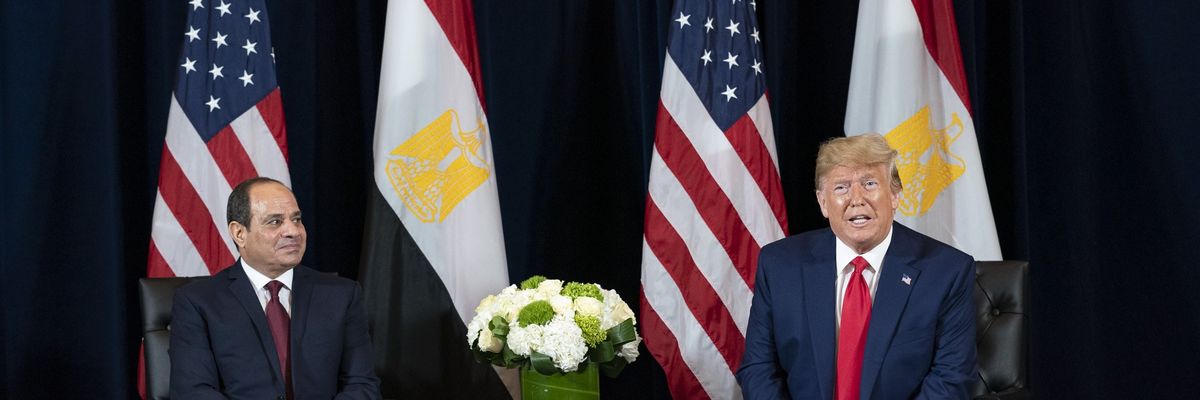The world that emerges from, or perhaps learns to better co-exist with, COVID-19 appears to be on two possible paths. One path recognizes that we must work collectively toward peaceful resolutions with enemies and invest resources more wisely to prevent future catastrophes. The United Nations Secretary General's call for a global ceasefire and countries coming together to support World Health Organization efforts for a coordinated global health response are signs of that world. Another path is built on isolationism, where authoritarian regimes, not cooperative ones, are further empowered and military capabilities continue to be front of mind.
The arms trade, which can provide both the tools for and the tacit acceptance of, repressive regimes may be a marker of the world ahead. Unfortunately, and without much attention, the Trump administration has been laying stakes on the darker path by continuing to support arms sales during the pandemic to some of the world's most repressive regimes.
The most startling, perhaps, are the possible sale of attack helicopters to the Philippines notified to Congress on April 30. Valued at either $1.5 billion or $450 million, depending on the helicopter type and list of lethal weaponry included, these sales would only lend support and capability to Philippine President Rodrigo Duterte who is using the pandemic to further expand his power to repress a population that has already seen tens of thousands killed in his "war on drugs."
For repressive regimes in the Middle East, the administration recently proposed $2.3 billion in sales to refurbish Apache attack helicopters in Egypt, where U.S. arms encourage abusive behavior. For the United Arab Emirates (UAE), where weapons have been used as fuel in the humanitarian crisis in Yemen, the administration proposes more than $700 million for thousands of mine resistant ambush protected vehicles (MRAPs) and helicopter spare parts.
In February, before the pandemic had rocked both countries, the president was in India with Prime Minister Narendra Modi to announce billions worth of arms sales. Last month, as the pandemic raged, the Trump administration notified Congress of an additional $150 million in potential missile and torpedo sales.
On April 28, however, the United States Commission on International Religious Freedom recommended that India be listed as a country of particular concern, a designation that should lead us away from arms provision and instead toward efforts that encourage the world's largest democracy to better protect its religious minorities.
And, finally, while arms sales to European countries typically do not elicit the same human rights concerns, those to Hungary should. On May 8, the administration notified Congress of possible sales of $230 million for air-to-air missiles to a regime under Viktor Orbán that has become so bad that Freedom House recently indicated it is no longer a democracy.
To its credit, Congress has not been entirely absent during Trump's presidency on these issues. Of the seven bipartisan efforts that the president has felt a need to veto, five have related to war powers or arms sales — three tied directly to his designation of a so-called "emergency" last year to rush arms to Saudi Arabia and the UAE. But there is much more Congress can and should do.
Rules that came into effect in early March that rob Congress’s oversight of the sale of assault weapons, sniper rifles, and their ammunition should be reversed. Legislation that would more strongly condition arms sales on human rights are worthy of attention, such as that introduced by Rep. Ilhan Omar in February. So too is an idea that is gaining greater attention, which is to "flip the script" so that Congress must approve certain arms sales, rather than oppose them. As evidenced by the majority opposition to Saudi/UAE arms sales in 2019, Congress today must pass a veto-proof resolution in both chambers in order to block an arms deal — a bar too high. A permanent fix, akin to that introduced by then- Senator Joe Biden in 1986, is in order and within Congress' power.
As fighter jets and missiles have proven not to provide protection against the COVID-19 pandemic, the wisdom of continuing to see true security as tied to military approaches and the provision of weaponry is increasingly drawn into question. Six months ago, government investment of trillions of dollars in domestic health supplies and care, and for business and income support, would have been unthinkable. Now, the question is not whether, but how much more to budget for. Americans, who, regardless of party affiliation, believed weapons sales did not make them safer before the pandemic, are increasingly aware that investing U.S. resources into fueling international repression and forever war is not a national interest.
Despite the U.S. desire to sell weapons, signs now indicate that countries around the world hit by the pandemic are likely to cut back their military spending in order to meet more human needs. With a market contracting and funds better spent at home, it is clearly the time to rethink U.S. arms sales.
















